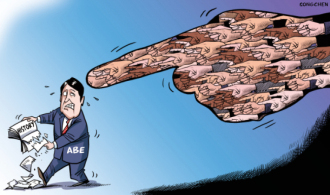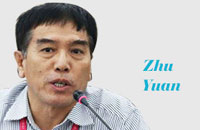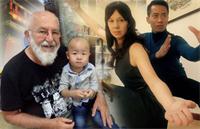Bad behavior and lack of education
By Zhu Yuan (China Daily) Updated: 2012-09-06 07:54

Don't do to others what you would not have them do to you. Never commit a sin, no matter how petty it is. And never consider yourself to be above doing a good deed, no matter how negligible.
Our sagas have left us a series of sayings meant to teach us how to behave. Nowadays, it seems that some Chinese have completely forgotten these admonitions and have taken to acting in any way they want on any particular occasion. Among those showing such a tendency are the two passengers who came to fisticuffs on Sunday on a Swiss International Airline flight, leading the crew onboard to turn the plane back.
According to an old saying, disgrace comes to people not by force but through invitation. Without showing concern for their fellow passengers, the two Chinese men brought shame on themselves and tarnished the image of the Chinese people. True, liquor played a role in the fight. But the men, if they were decent and sensible, should have known in the first place to not drink too much before boarding an airplane.
Then on Jan 3, 2010, Jiang Haisong, a 28-year-old Chinese student at Rutgers University, breached a security line at Newark Liberty International Airport to kiss his girlfriend goodbye, a show of affection that caused the terminal he was in to be shut down for six hours and many flights to be canceled.
Twice in August, passengers expressed grievances about flight delays by rushing onto runways and preventing other flights from taking off.
What these people have shown through these absurd actions is nothing but selfishness in one of its most extreme forms. Human sentiments such as indignation and affection can easily run out of control when one is accustomed to putting one's private interests before everything else.
It is sad that they have forgotten this simple principle: That no one's interests are well protected when everyone is only concerned about his or her own interests.
There can never be enough caution exercised on flights, when every error can prove disastrous and cost the lives of passengers. That's why the first hint of bad weather or mechanical defects often leads to delays.
I don't believe air traffic controllers would prevent a plane from taking off on time without having good reason for doing so. When flights I've been on in the United States have been delayed, no one onboard ever jumped to their feet and pointed their fingers at airport staff.
Well-educated and civilized people know how to understand others, how to put themselves into the shoes of others and how to consider the interests of both their fellow citizens and the general public when making important decisions.
Harmony will hardly prevail unless everyone takes pains to respect the interests of others and to use the right methods of protecting their own interests.
More and more Chinese are coming to recognize the importance of protecting what is their due in society. Yet, some seem to have gone too far and guarded their own rights and interests at the expense of others'.
With 5,000 years of civilization, our country is supposed to have a culture that values courtesy and propriety. In these latest incidents of bad behavior, the blame apparently falls on a lack of education both in the home and at school about the basic virtues of propriety, right behavior, honesty and possessing a sense of shame.
Education is narrowly understood by many as merely being instruction in useful techniques and knowledge, rather than the cultivation of sound and civilized character. This, I suppose, is where the real problem lies.
We need experts with PhD degrees who can achieve innovations in science and technology. We also need technicians, skilled workers and scholars who can excel in the work they do in various fields. But these people also need moral integrity and sound characters.
Imagine if an increasing number of citizens were concerned only about their own rights and interests without ever being willing to contribute to the well-being of the broader community. What sort of world would we live in?
The author is a senior writer with China Daily. E-mail: zhuyuan@chinadaily.com.cn
(China Daily 09/06/2012 page8)











